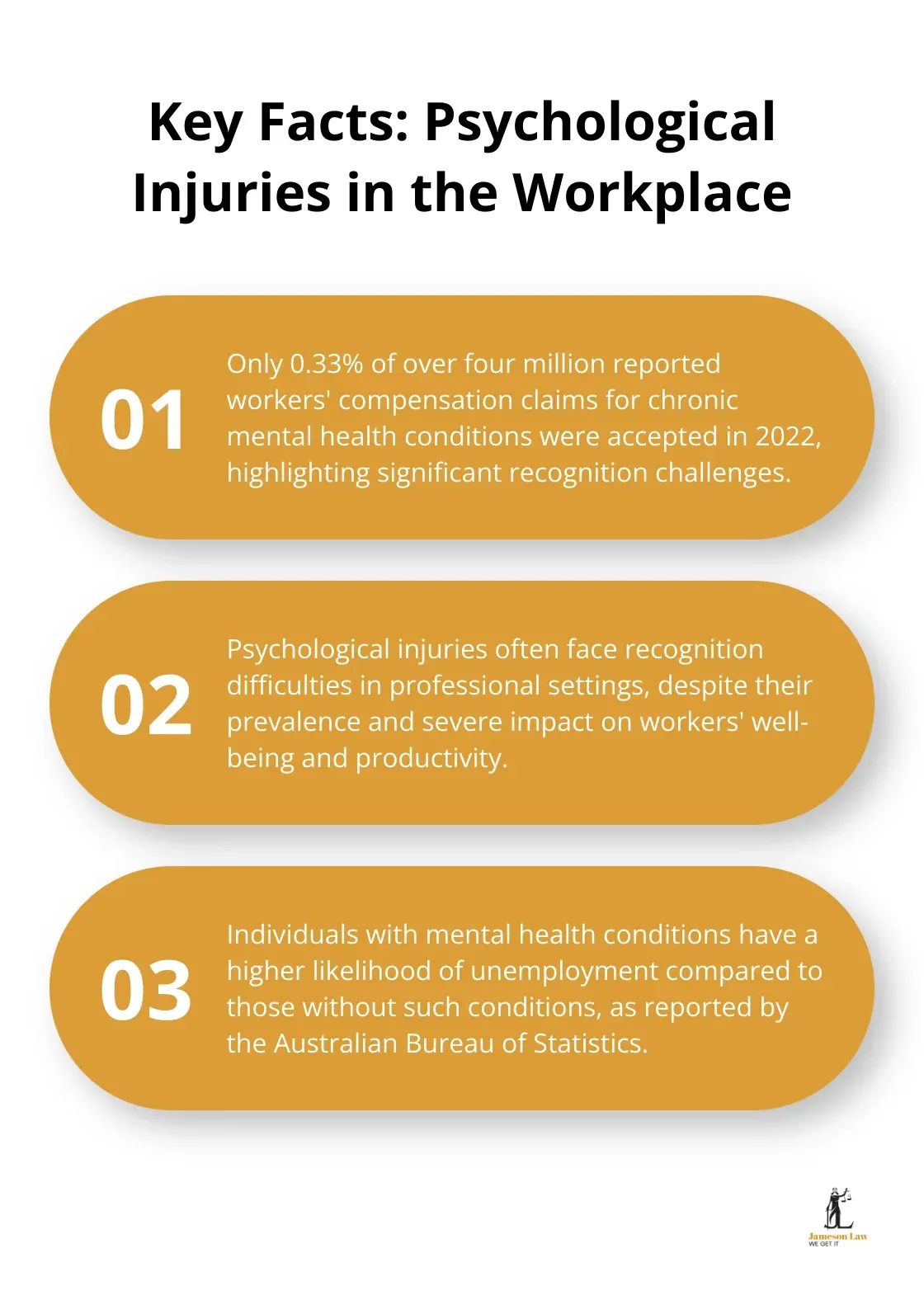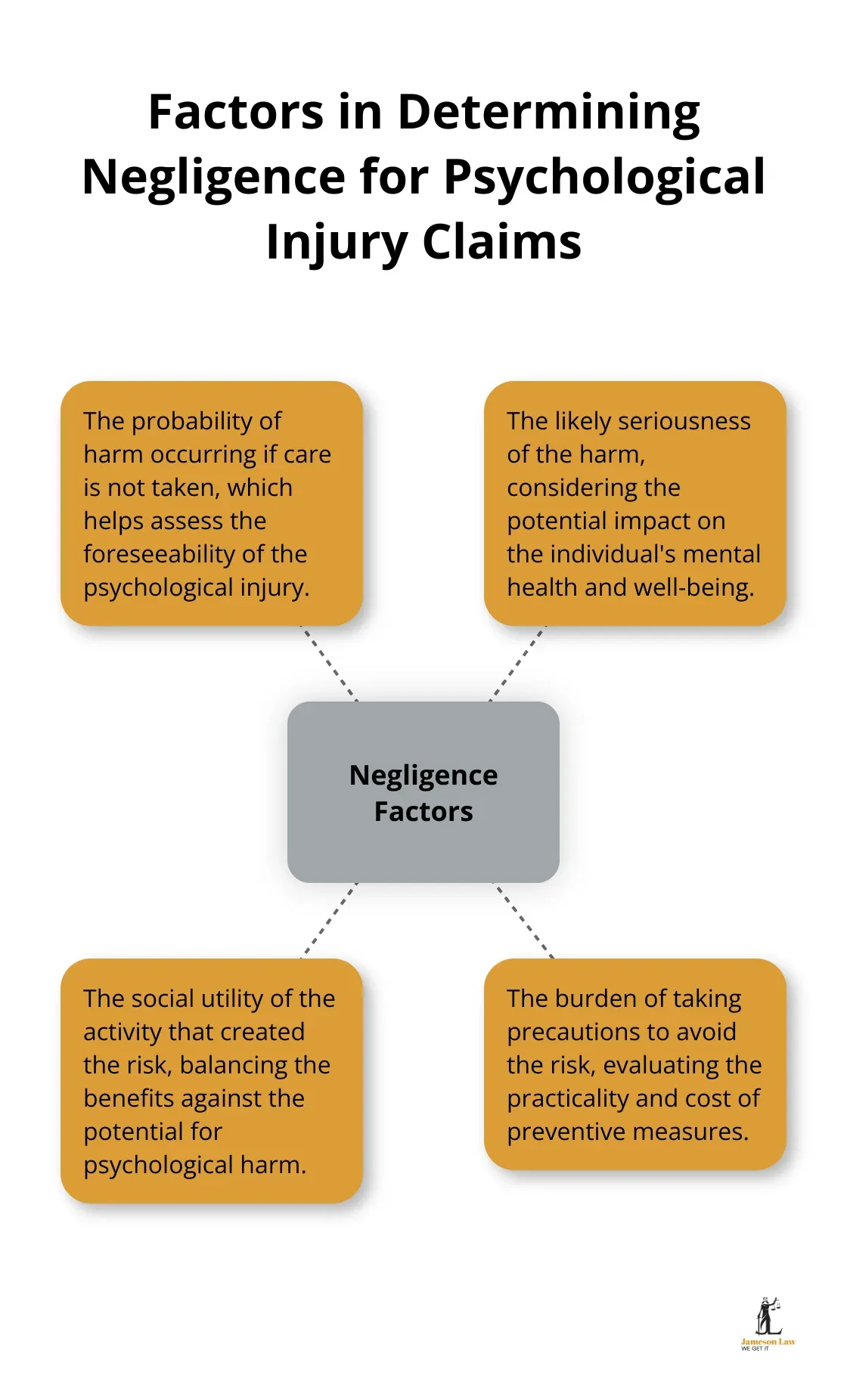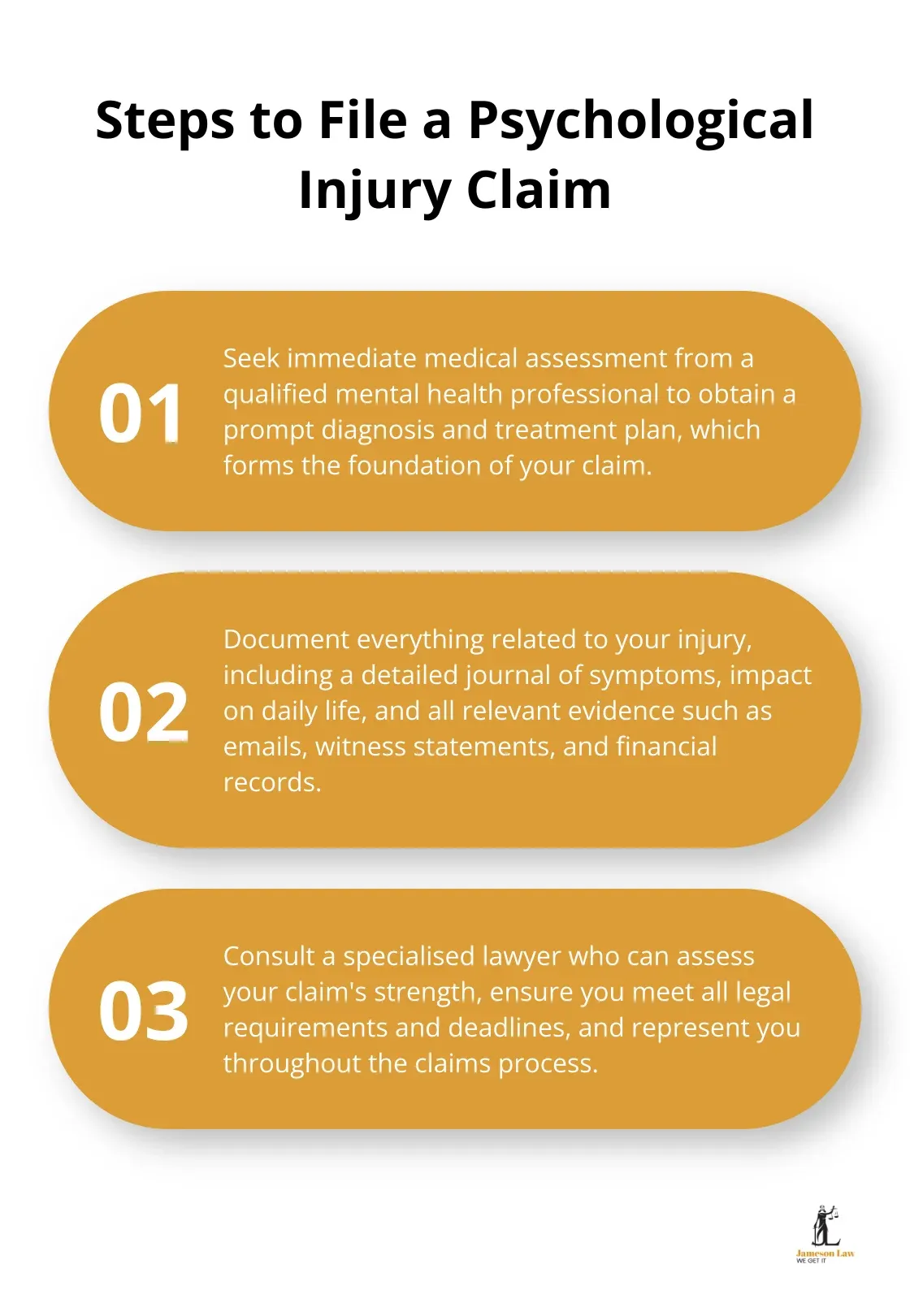Psychological injuries can be just as devastating as physical ones, yet they often go unrecognised or misunderstood. At Jameson Law, we’ve seen firsthand the impact these invisible wounds can have on a person’s life and well-being.
Filing common law claims for psychological injury requires a thorough understanding of legal processes and medical evidence. This guide will walk you through the essential steps to seek compensation and justice for your mental health struggles.
What Are Psychological Injury Claims?
Definition and Legal Recognition
Psychological injury claims in Australian law seek compensation for mental harm caused by another party’s negligence. These claims are recognised under the Civil Liability Act 2002 (NSW) and similar legislation in other states. The legal system acknowledges that mental health injuries can be as severe and life-altering as physical ones. Recent draft legislation introduces cost-saving measures, particularly targeting psychological injury claims.
Common Types of Psychological Injuries
The most frequent psychological injuries in legal claims include:
- Post-Traumatic Stress Disorder (PTSD)
- Depression
- Anxiety disorders
- Adjustment disorders
The Australian Institute of Health and Welfare (AIHW) releases reports and data on national major health and welfare issues.
Workplace Recognition Challenges
Despite their prevalence, psychological injuries often face recognition challenges in the workplace. Safe Work Australia reports that accepted workers’ compensation claims for chronic mental health conditions in 2022 accounted for only 0.33% of over four million reported cases. This low percentage underscores the difficulties in validating and recognising psychological injuries in professional settings.

Impact on Daily Life
Psychological injuries can lead to severe life disruptions. They affect:
- Cognitive function
- Sleep patterns
- Personal relationships
- Employment prospects
The Australian Bureau of Statistics reports that individuals with mental health conditions have a higher likelihood of unemployment compared to those without such conditions. These impacts can be just as debilitating as physical injuries (if not more so), resulting in significant financial losses due to inability to work, medical expenses, and ongoing treatment costs.
Legal Elements for a Successful Claim
To file a successful psychological injury claim, you must establish several key elements:
- Duty of Care: Prove that the defendant owed you a duty of care, particularly in a workplace context.
- Breach of Duty: Show that the defendant failed to prevent psychological harm despite knowledge of potential issues.
- Causation: Link the defendant’s negligence directly to your psychological injury, often requiring expert medical testimony.
- Diagnosis: Obtain a formal diagnosis from a mental health professional for a recognised psychiatric condition.
The High Court case of Koehler v Cerebos (Australia) Ltd [2005] emphasised employer responsibilities to prevent psychiatric injuries, setting a precedent for many psychological injury claims. A recent case set a precedent for claims related to emotional distress caused by the manner of dismissal.
As we move forward, it’s important to understand the specific eligibility requirements and steps involved in filing a common law claim for psychological injury. Let’s explore these crucial aspects in the next section.
Meeting Eligibility Requirements for Psychological Injury Claims
Establishing a Duty of Care
The foundation of any psychological injury claim is the proof that the defendant owed you a duty of care. In workplace settings, this is often straightforward as employers must provide a safe working environment (including mental health protection). However, other situations may require more complex arguments.
A recent case involved a shopping centre’s duty of care to a customer who experienced severe anxiety after being trapped in a malfunctioning lift for several hours. The court ruled that the centre had a responsibility to maintain safe facilities for patrons.
Proving Negligence or Breach of Duty
After establishing a duty of care, you must show that the defendant breached this duty through negligence. This involves demonstrating that they failed to take reasonable steps to prevent psychological harm.
The Civil Liability Act 2002 in NSW outlines factors courts consider when determining negligence:
- The probability of harm
- The likely seriousness of the harm
- The social utility of the activity that created the risk
- The burden of taking precautions

The Koehler v Cerebos (Australia) Ltd [2005] case significantly influenced how courts assess negligence in psychological injury cases. This decision confirms that when considering liability in negligence for a psychological injury, the Court will have regard to the nature of a worker’s duties.
Demonstrating Causation
You must prove a direct link between the defendant’s actions (or inactions) and your psychological injury. This often requires expert medical testimony to establish that the incident significantly contributed to your condition.
Pre-existing mental health conditions don’t necessarily prevent you from making a claim. However, you’ll need to show that the incident exacerbated your condition or caused a new psychological injury.
Time Limits for Filing Claims
Strict time limits apply to personal injury claims in NSW, including those for psychological injuries. You generally have three years from the date the injury was discovered to file a claim. This period can extend in certain circumstances, such as when the full extent of the injury isn’t immediately apparent.
For work-related psychological injuries, you must notify your employer as soon as possible and make a workers’ compensation claim within six months. Missing these deadlines can seriously jeopardise your claim.
Seeking Professional Help
Many people delay seeking help, thinking their psychological symptoms will improve over time. This can make it harder to establish a clear link between the incident and the injury. We always advise seeking professional help and legal advice as soon as possible after experiencing a potentially compensable incident.
Understanding these eligibility requirements is just the beginning of filing a successful psychological injury claim. The next phase involves gathering evidence and navigating the claims process. Let’s explore how to build a strong case and present compelling evidence to support your claim.
How to File Your Psychological Injury Claim
Seek Immediate Medical Assessment
The first step is to obtain professional medical help as soon as possible after the incident. A prompt diagnosis from a qualified mental health professional will strengthen your claim. The Australian Psychological Society provides guidance on the provision of services to people with mental health issues.
Schedule an appointment with a psychologist or psychiatrist immediately. They will assess your condition, provide a formal diagnosis, and create a treatment plan. This medical documentation forms the foundation of your claim.
Document Everything
Thorough documentation is essential for a successful claim. Start a detailed journal to record how the psychological injury affects your daily life. Include information about:
- Sleep disturbances
- Changes in appetite
- Difficulty concentrating
- Impact on relationships
- Inability to perform work duties
Collect all relevant evidence, including emails, text messages, and witness statements that support your claim. For work-related injuries, gather performance reviews and any correspondence about workplace issues.
Financial records are also important. Track all medical expenses and any income loss due to your condition. Under current Australian federal tax law, personal injury settlements are generally not treated as taxable income.
Consult a Specialised Lawyer
The legal complexities of a psychological injury claim can overwhelm many people. It’s important to consult with a lawyer who specialises in this area of law. A specialised lawyer will:
- Assess the strength of your claim
- Ensure you meet all legal requirements and deadlines
- Help gather and organise evidence
- Negotiate with insurance companies on your behalf
- Represent you in court if necessary
File Your Claim Correctly
After you gather all necessary evidence and consult with a lawyer, file your claim. In NSW, most psychological injury claims are lodged with the District Court. Your lawyer will prepare the Statement of Claim, which outlines the details of your case and the compensation you seek.
File within the statutory time limits. In NSW, you generally have three years from the date of injury to file a claim (this can vary depending on the circumstances). Missing this deadline can result in your claim being barred.

Navigate the Negotiation Process
After filing, the defendant (usually an insurance company) will respond to your claim. This often leads to a negotiation process. Your lawyer will handle these negotiations to secure the best possible outcome for you.
This process takes time. Throughout this process, continue with your medical treatment and keep detailed records. Your ongoing medical care and its impact on your life can influence the final compensation amount.
Final Thoughts
Filing common law claims for psychological injury requires attention to detail and understanding of legal requirements. Each step, from establishing duty of care to proving causation, plays a vital role in building a strong case. Immediate medical assessment and treatment provide essential documentation for your claim and ensure your well-being.
Time limits are critical when filing claims for psychological injury. Prompt action helps preserve your right to compensation and allows for gathering fresh evidence. Professional legal advice can guide you through the complexities of the legal system and advocate on your behalf during negotiations or in court.
We at Jameson Law understand the challenges faced by those suffering from psychological injuries. Our team specialises in personal injury claims, including those related to mental health. We offer support throughout the claims process, from initial assessment to final resolution.










